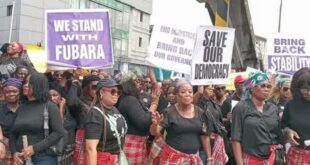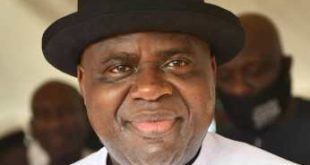The second edition of the Women’s Climate Assembly (WCA), to be held in Lagos, Nigeria from September 24 to 28, 2023, will bring together women from fourteen countries across Central and West Africa, under the theme, ‘African Women Unite for Climate Justice, Reparations and Development Alternatives.’
This follows the success of last year’s inaugural assembly in Port Harcourt, Nigeria, and has “overarching goal is to support and unite women-led movements in Africa against dirty energy, the new ‘green’ assault on Africa’s mineral wealth and false climate change solutions which allow mega corporations to continue doing damage to the planet.”
According to a statement made available to our correspondent by Fabian Nsemeke, of Kebetkache Women Development & Resource Centre, and Connie Nagiah (WoMin African Alliance), the assembly “enables women to build new knowledge together, strengthen their struggles, and propose the women-centered development alternatives that allow people to live lives of dignity with improved income and public services, adapt to a rapidly warming climate, and defend nature and its right to exist in a reciprocal relationship with humans.
“The WCA is a collective effort led by a steering group of women’s movements, grassroots networks, and a few non-governmental organisations (NGOs) working in solidarity with women in resistance. Grassroots women from communities in Benin, Burkina Faso, Côte d’Ivoire, Cameroon, the Democratic Republic of the Congo, Guinea-Conakry, Liberia, Mali, Nigeria, Senegal, and Sierra Leone, will gather to build solidarity and counter power against the corporations and governments that are threatening all life on Mother Earth,” the statement said.
It further said that for women fighting for climate justice, the WCA is a crucial political space for education, activism, camaraderie, and movement building. “The Assembly will give over one hundred community activists and leaders from fourteen countries the opportunity to learn, build mutual understanding and solidarity, teach each other, craft political solutions which address their interests, and most importantly make women who carry the costs of the climate crisis visible.”
Quoting Josiane Yebi Boyo of Côte d’Ivoire, Nsemeke and Nagiah pointed out that “The strength of women climate assemblies is in their commitment to leaving no one behind, ensuring that the most vulnerable are not only part of the conversation but also the solution”
The climate crisis, they said, is growing in sub-Saharan Africa, “which is heating faster than elsewhere in the world, and is on the brink of breaching the elusive 1.5 degrees of climate warming scientists have long warned against. The signs of the growing climate crisis are here – severe droughts in the Horn of Africa and southern Africa; sea level rises which have engulfed whole villages across West Africa; cyclones affecting southern Africa; and rapidly contracting water bodies which are fueling conflict and war. Food insecurity levels are rising, and African lives and livelihoods are in grave danger because 60% of our population, primarily peasant women food producers, rely on agriculture and local food systems to exist. Given their ties to nature and their ‘traditional’ caregiving roles, it is African women who bear the heaviest brunt of the climate crisis.
“As the world burns, the United Nations Framework Convention on Climate Change (UNFCCC) and the Conference of Parties (COPs) has been hijacked by corporate interests and stymied by the interests of wealthy countries who undermine solutions that address the underlying causes of climate change. Corporate polluters and their government negotiators at the UNFCCC have thwarted efforts to ensure that countries that have made the largest historical contributions to the climate crisis acknowledge their historical responsibility, commit to taking the deepest carbon cuts in the shortest amount of time possible, and fully provide for the loss and harm they have caused to peoples around the world who are now bearing the highest costs of climate warming,” they said.
While further quoting Mariama Sonko of Senegal, Nsemeke and Nagiah further pointed out that “Grassroots women defending the environment and fighting for climate justice are the true heroes of our time, working tirelessly to heal our planet and secure a brighter future for all.”
The Women’s Climate Assembly coincides with the third African People’s Counter COP from 18 to 29 September which aims to center and strengthen African voices and movements at the frontline of the climate crisis.
The statement noted that “It is here that the WCA will converge with community and women’s assemblies across the continent to build and advance a deeply Pan African perspective on the climate crisis and African climate justice.”
 PH Mundial – Port Harcourt Online Newspaper News Across The Region
PH Mundial – Port Harcourt Online Newspaper News Across The Region





